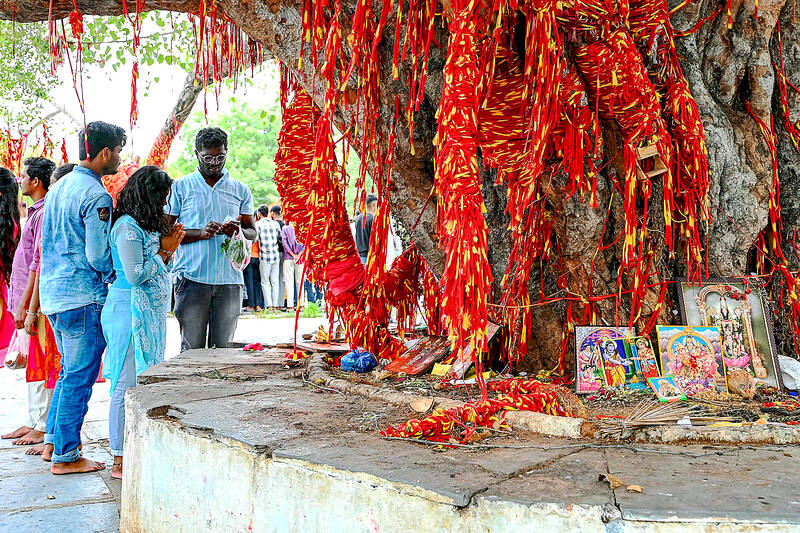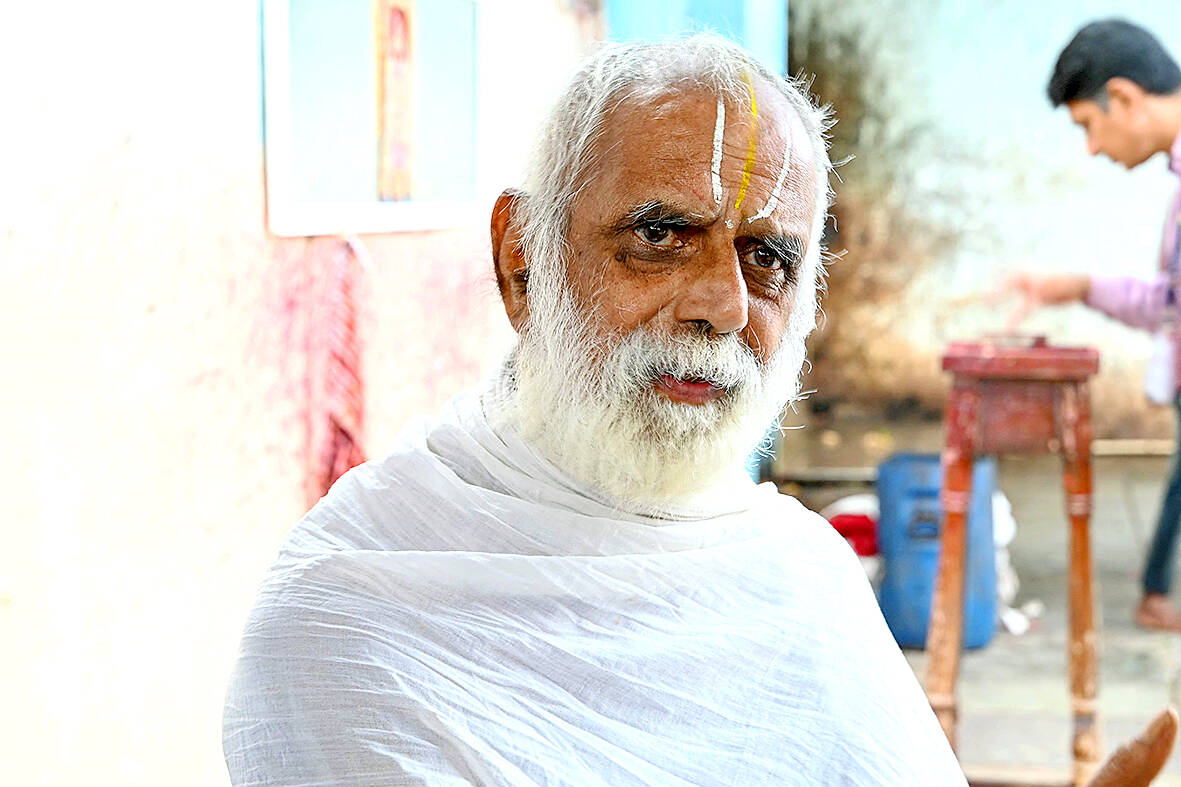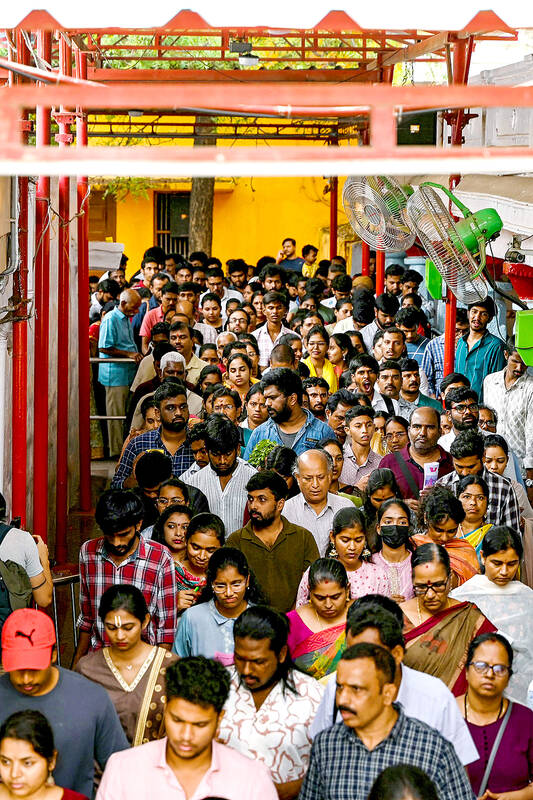Some gods grant riches and others good luck, but one deity in India offers a much less nebulous fortune to his devotees: tickets to a new life in the US.
More than 1,000 Hindu faithful visit the Chilkur Balaji temple each day in the belief that the divine presence inside can bless worshippers with a successful visa application. Those seeking a shot at the American Dream are instructed to pray for their permission to travel abroad, and to return to give thanks when they receive it.
“Every single member of my family who is in the US has come here,” said Satwika Kondadasula while walking around the temple’s sanctum. The 22-year-old said that moving to New York was a longstanding dream. She will head there this week to start her master’s degree and says she has the deity Balaji in part to thank. “I got the visa because of my capability of course, but I have luck of god as well,” she said. “I definitely believe coming here really helped me out.”

Photo: AFP
Balaji is considered an incarnation of Vishnu, one of the key gods of the Hindu pantheon known for upholding the cosmic order of the universe. The temple bearing his name on the outskirts of Hyderabad was not always known as a conduit for international travel. Its elderly priest C.S. Gopalakrishna discovered in 1984 that water spontaneously appeared before a shrine to the god when he walked around the perimeter of the temple’s sanctum 11 times. Word spread and people began visiting the temple to offer wishes for happy marriages, children, or successfully navigating the cut-throat admissions process to India’s top colleges.
‘BLIND BELIEF’
Over the decades, devotees came to believe the shrine was particularly effective helping Indians seeking to leave the country — so much so that it came to be locally known as the “visa temple.”

Photo: AFP
Pilgrims emulate Gopalakrishna’s 11 laps around the temple sanctum, returning later if their wishes are filled to circumnavigate it a further 108 times as an expression of gratitude.
The ritual demands precision. Visitors chanting Balaji’s name in unison keep track of the longer walk with the aid of yellow sheets of paper marked with numbered boxes given out by the temple. Gopalakrishna says that divine intervention is not guaranteed, and his god helps those who help themselves. “You should work hard,” he said. “Balaji will help if you have blind belief in him.”
‘DREAM LAND’

Photo: AFP
India is now the world’s fifth-largest economy and still enjoys world-beating GDP growth, but hundreds of thousands of its citizens still leave the country each year seeking better opportunities abroad.
While the diaspora spans the globe, the US remains the destination of choice.
The most recent census there showed its Indian-origin population had grown by 50 percent to 4.8 million in the decade to 2020, while more than a third of the nearly 1.3 million Indian students studying abroad in 2022 were in the US.
“America is still the dream land,” said visa consultant Sakshi Sawhney, who helps Indians negotiate the often perplexing paperwork needed to travel to Western countries.
“That is not going away anytime soon.”
‘BETTER POSITIONS’
Sawhney lived for a time in the US before returning to guide others through the process, and said she herself had visited the Balaji temple while waiting for her visa. While she does not tell her clients to pray there, she says many tell her that they had done so of their own accord.
Looming presidential elections have focused attention on the heights Indian-origin Americans have scaled. The mother of Democratic nominee Kamala Harris was born in the southern city of Chennai before her acceptance to Berkeley for her master’s degree aged 19. The wife of Donald Trump’s pick for vice-president, Usha Vance, was born in San Diego to Indian immigrant parents with family roots not far from the temple.
“It is a great, inspiring moment. Indians are moving around the world and they are in better positions right now,” said Ajay Kumar, at the Balaji shrine. Kumar, 25, has returned to the temple to give thanks to the deity, brimming with excitement before his imminent departure to Tampa Bay, where he will work as a chef.
“America is the place where all my dreams will be fulfilled,” he said.

Towering high above Taiwan’s capital city at 508 meters, Taipei 101 dominates the skyline. The earthquake-proof skyscraper of steel and glass has captured the imagination of professional rock climber Alex Honnold for more than a decade. Tomorrow morning, he will climb it in his signature free solo style — without ropes or protective equipment. And Netflix will broadcast it — live. The event’s announcement has drawn both excitement and trepidation, as well as some concerns over the ethical implications of attempting such a high-risk endeavor on live broadcast. Many have questioned Honnold’s desire to continues his free-solo climbs now that he’s a

As Taiwan’s second most populous city, Taichung looms large in the electoral map. Taiwanese political commentators describe it — along with neighboring Changhua County — as Taiwan’s “swing states” (搖擺州), which is a curious direct borrowing from American election terminology. In the early post-Martial Law era, Taichung was referred to as a “desert of democracy” because while the Democratic Progressive Party (DPP) was winning elections in the north and south, Taichung remained staunchly loyal to the Chinese Nationalist Party (KMT). That changed over time, but in both Changhua and Taichung, the DPP still suffers from a “one-term curse,” with the

Lines between cop and criminal get murky in Joe Carnahan’s The Rip, a crime thriller set across one foggy Miami night, starring Matt Damon and Ben Affleck. Damon and Affleck, of course, are so closely associated with Boston — most recently they produced the 2024 heist movie The Instigators there — that a detour to South Florida puts them, a little awkwardly, in an entirely different movie landscape. This is Miami Vice territory or Elmore Leonard Land, not Southie or The Town. In The Rip, they play Miami narcotics officers who come upon a cartel stash house that Lt. Dane Dumars (Damon)

Jan. 26 to Feb. 1 Nearly 90 years after it was last recorded, the Basay language was taught in a classroom for the first time in September last year. Over the following three months, students learned its sounds along with the customs and folktales of the Ketagalan people, who once spoke it across northern Taiwan. Although each Ketagalan settlement had its own language, Basay functioned as a common trade language. By the late 19th century, it had largely fallen out of daily use as speakers shifted to Hoklo (commonly known as Taiwanese), surviving only in fragments remembered by the elderly. In